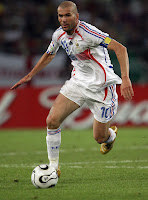TEAMS PLAYED FOR
Corinthians (
AC Milan (
Real
Inter
FC Barcelona (
PSV
Cruzeiro (
BIO
Question - what does one need to become a famous soccer player? Answer – you have to be born in
This is exactly what made Ronaldo Luis Nazario de Lima (known as simply, Ronaldo) a famous player. Ronaldo was born on September 18, 1976 in the suburb of Rio-de-Janeiro. The parents named him Ronaldo in honor of his mom’s doctor, Ronaldo Valiente. When he turned four, his father bought him a cheap soccer ball as a gift. It was his own ball, not borrowed from his brother or friends. Ronaldo instantly fell in love with the round object. While most children were falling asleep hugging stuffed animals, Ronaldo was hugging the soccer ball. The boy kicked the ball around the house and would even yell “Pass, pass the ball…” in his sleep. His parents didn’t really care as soccer was a big part of their life also.
Ronaldo could not speak until he turned three but way before then he would watch his father play soccer with his friends. When he turned five, he started playing himself and everyone could see that he had a God given talent. Every free minute he tried to play soccer. Ronaldo hated school, especially mathematics. There were days when he would skip school just so he would kick the ball around with his friends who loved it as much. His father was working for a telephone company and his mom sold ice-cream all day, so there was no one really around to check his homework, which actually made the boy happy as he continued to master his soccer skills in the streets.
When Ronaldo turned 12 he was asked to play on an indoor soccer team. At first the coach made him a goalkeeper but he could not stay still and kept trying to play in the field. Ronaldo played very well and then one day decided that this team was too small for him and decided to try out for
CLUB CAREER
One day when Ronaldo was 13 years old, after one of the games, he told his friends that one day he will be rich and famous. He also gave himself the word that he would help his family out of poverty. Ronaldo’s talent was noticed by scouts and he was asked to play for
When Ronaldo turned 18 he signed his first professional contract with a European team – PSV from
There came Real Madrid and AC Milan. After a serious knee injury at one of the games, Ronaldo was forced to move to
NATIONAL TEAM CAREER
Ronaldo went to the World Cup in the
2002 World Cup in Korea/Japan was more successful for Ronaldo. He once again led his team to the tournament final where
PERSONAL INFO
Ronaldo loves women and has been in many relationships with them. At one point he was married to Milene Domingues, Brazilian female soccer player. The marriage lasted 4 years and the couple has a son, Ronald. Ronaldo is currently in a relationship with Maria Beatriz Antony with whom he has a daughter, Maria. The family lives in San Paolo , Brazil
Ronaldo is co-owner of Brazilian A1 race team.
TITLES AND AWARDS
Cruzeiro
Campeonato Mineiro: 1994
PSV Eindhoven
Dutch Cup: 1996
FC Barcelona
Spanish Super Cup: 1996
UEFA Cup Winners Cup: 1997
Spanish Cup: 1997
Inter Milan
UEFA Cup: 1998
Real Madrid
La Liga: 2003, 2007
Spanish Super Cup: 2003
Intercontinental Cup: 2002
Corintians
Campeonato Paulista: 2009
International
FIFA World Cup (winner): 1994, 2002
Copa America
FIFA Confederations Cup: 1997
Summer Olympics (bronze medal): 1996
FIFA World Player of the Year: 1996, 1997, 2002
Ballon D’Or: 1997, 2002
FIFA 100
FIFA World Cup all time scoring leader (as of 2009)







